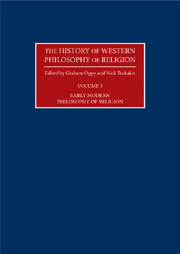Book contents
- Frontmatter
- Contents
- Editorial Introduction
- Contributors
- 1 Early Modern Philosophy of Religion: An Introduction
- 2 Niccolò Machiavelli
- 3 Martin Luther
- 4 John Calvin
- 5 Michel de Montaigne
- 6 Francisco Suárez
- 7 Thomas Hobbes
- 8 René Descartes
- 9 Ralph Cudworth
- 10 Blaise Pascal
- 11 Baruch Spinoza
- 12 John Locke
- 13 Gottfried Wilhelm Leibniz
- 14 George Berkeley
- 15 Voltaire
- 16 The Deists
- 17 Jonathan Edwards
- 18 Thomas Reid
- 19 David Hume
- 20 Denis Diderot
- 21 Immanuel Kant
- 22 Gotthold Ephraim Lessing
- 23 William Paley
- Chronology
- Bibliography
- Index
5 - Michel de Montaigne
- Frontmatter
- Contents
- Editorial Introduction
- Contributors
- 1 Early Modern Philosophy of Religion: An Introduction
- 2 Niccolò Machiavelli
- 3 Martin Luther
- 4 John Calvin
- 5 Michel de Montaigne
- 6 Francisco Suárez
- 7 Thomas Hobbes
- 8 René Descartes
- 9 Ralph Cudworth
- 10 Blaise Pascal
- 11 Baruch Spinoza
- 12 John Locke
- 13 Gottfried Wilhelm Leibniz
- 14 George Berkeley
- 15 Voltaire
- 16 The Deists
- 17 Jonathan Edwards
- 18 Thomas Reid
- 19 David Hume
- 20 Denis Diderot
- 21 Immanuel Kant
- 22 Gotthold Ephraim Lessing
- 23 William Paley
- Chronology
- Bibliography
- Index
Summary
Michel de Montaigne (1533–92) came from a rich bourgeois family that acquired nobility after his father fought in Italy in the army of King Francis I of France. For his grandfather and father the sixteenth century was a period of remarkable social ascent. Yet, from 1562 onwards, France became “a disturbed and sick state” (III.8, F.719)1 as the wars of religion between Catholics and Huguenots were fought with varying intensity to 1592. In fact, religious faith was only one aspect of the crisis; family clans and friendships did not always correspond to confessional differences. A number of his family members and friends converted to Protestantism, but Montaigne remained faithful to the Catholic Church. Replicating Petrarca's choice in De vita solitaria (On the solitary life), he chose to dedicate himself to the Muses. In his library, which was quite large for the time, he had wisdom sayings carved on the wooden beams. These sayings were drawn from the Book of Ecclesiastes, Sextus Empiricus, Lucretius and other classical authors, whom he read intensively.
In spite of a tradition rooted in the nineteenth century, which tended to relegate his work to the expression of a frivolous subjectivity, Montaigne shook some fundamental aspects of Western thought, such as the superiority we assign to human beings over animals (II.12), to reason over custom (I.23), to reason over the world and to European civilization over others (such as the “Barbarians” of Brazil, I.31).
- Type
- Chapter
- Information
- The History of Western Philosophy of Religion , pp. 65 - 74Publisher: Acumen PublishingPrint publication year: 2009

